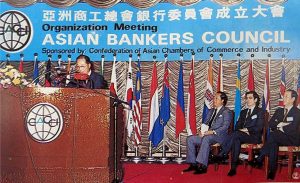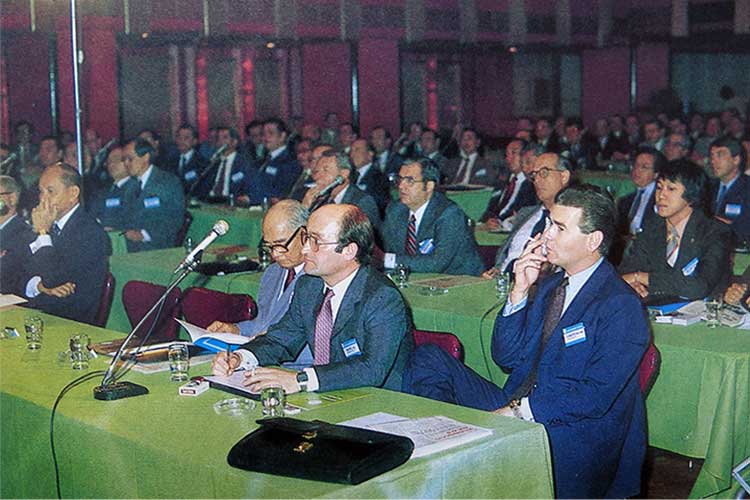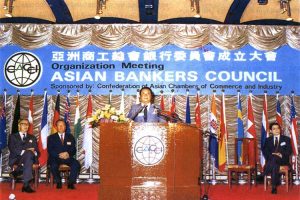History

On October 28-29. 1981
Bankers with presence in Asia took the first step toward forging closer regional links when 217 representatives of 139 banks met in Taipei to formally establish the Asian Bankers Council. The countries represented included Australia, Hong Kong, India, Indonesia, Japan, Malaysia, New Zealand, the Philippines, the Republic of China (Taiwan), Singapore, South Korea and Thailand.

Organized under the umbrella of the Confederation of Asia-Pacific Chambers of Commerce and Industry (CACCI)
During the term of then CACCI President Dr. Jeffrey L. S. Koo, the Taipei meeting was the largest gathering of bankers with Asian presence to be convened in the region at that time. CACCI sponsored the meeting with the view to exploring banking opportunities in Asia and to enhance the role of bankers in the economic development of the region.

Dr. Koo, in his Opening Address at the organizational meeting, said that
The purpose of the Asian Bankers Council was to provide an opportunity for all bankers in Asia to get acquainted with each other and to develop a bond of fellowship among themselves which hitherto may not have existed. We hope that through such personal relationships, Asian bankers could do more for the businesses and industries in the region, thus helping accelerate economic development in all Asia countries.


During the organizational meeting, the delegates adopted the ABA Charter.
They also elected 11 members to sit in the first Board of Directors for the two-year term from 1981 to 1983. Mr. Ronald H. C. Ho, then President of the International Commercial Bank of China from the Republic of China (Taiwan), was elected the first Chairman of the Asian Bankers Council, and Mr. George S. K. ty, Chairman of the Metropolitan Bank & Trust Co. from the Philippines, as Vice Chairman. Among the first activities of the Board was the ratification of the organization’s Charter.
Activities
To achieve the above-mentioned objectives, the ABA undertakes the following activities:

2016 Ha Long Bay – Policy Advocacy Committee Chairperson Prudence Lin
Policy advocacy is a major thrust of ABA program. Members jointly formulate statements on issues and policies that relate to banking and finance in the regional and international arena. The principal objective is to come up with a paper that articulates the position of ABA on these issues and, if deemed appropriate, to submit the paper to the regional or international body tasked with addressing those issues.
Towards this end, the ABA Special Committee on Policy Advocacy has been created to identify issues on banking and finance that may be covered by the Association for policy advocacy. Composed of banking and finance experts as well as members of the ABA Board, this Committee meets from time to time to achieve this objective.
Since its creation, the committee has done considerable work in several areas, including:
- Local currency bond market development;
- The development of domestic credit rating agencies;
- The Basel II Framework;
- Promoting regional convergence toward IFRS;
- Insolvency law and informal workouts;
- Corporate governance;
- Financial inclusion and microfinance;
- Credit reporting systems;
- Disaster-preparedness;
- Financial literacy;
- FATCA compliance; and
- Basel III framework. Through these, the ABA was able to make significant contributions to the work of regional and international policy-making and regulatory bodies.
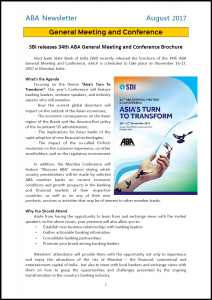
2017 August – ABA Newsletter
ABA issues the following publications, among others, to serve as information link between the officers and members:
- ABA Newsletter: This monthly publication is effectively utilized as a channel for communications between the officers, the Secretariat and the members and as a medium for exchange of the latest news and information on banking and finance, member-bank activities, member-bank personalities, as well as on services available to members. Members are encouraged to contribute articles regarding activities in their respective banks, as well as on financial developments in their own countries.
- ABA Journal of Banking and Finance: This semi-annual publication contains enlightening and informative articles, monographs and occasional papers, and speeches on banking and finance, economic development and regional economic cooperation. Contributions of articles are also sought regularly from member banks.
- Year-End Review: Issued at the start of the year, this contains a summary report of the activities undertaken by the ABA during the previous year.

2017 Kuala Lumpur – Maybank hosts ABA Short Term Visiting Program
The ABA conducts training and professional development programs for its members. Through these training programs, the ABA aims to heighten the level of awareness among its members about the importance of training and continuing education in making them ready and equipped to cope with the many changes in the market. In particular, it strives to accelerate and conduct more training courses for members in light of the new issues emerging in the banking sector to upgrade the general awareness of bank managers on these issues. Towards this end:
- The ABA continuously explores with other training institutes the feasibility of jointly conducting short-term courses for ABA members on specific banking and financial topics.
- ABA continues to organize short-term visiting programs under which member bank executives from developing or emerging economies will visit member banks in more advanced countries for the purpose of studying and undergoing training on specific aspects of the operations and facilities of the more advanced host banks. The idea is to give the visitors the opportunity to
- enhance and upgrade their technical skills and knowledge in specific areas such as international banking, treasury activities, investment, and foreign exchange in the distinct and peculiar social, economic and business environment of the host country, and
- gain first-hand knowledge of the operations, systems and work procedures of the host bank’s various line departments.
- The ABA, on a selective basis, endorses conferences, seminars and other training programs conducted by other events organizers deemed to be beneficial and useful to members and will help in promoting the Association. The decision to endorse or support an event will be based on the following criteria: credibility/reputation of the event organizer; quality of the program; expected benefits to ABA and our members; timing of the event; and maximum two or three events per year. Endorsement will be made by authorizing the organizers to use the ABA logo in the promotional materials and by encouraging participation of members.
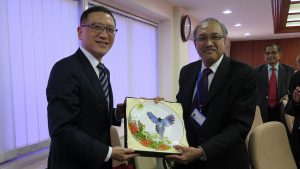
2017 Mumbai – ABA Chairman Daniel Wu visits Indian Banks’ Association CEO V. G. Kannan
ABA endeavours to strengthen relationship with bankers’ associations in other regions and countries in and outside the Asia-Pacific as a way of promoting ABA’s name and expanding membership. Cooperation is established through the exchange of guests at conferences and seminars, exchange of publications, participation at each other’s training programs, and collaboration in research activities. Officers and representatives of the Secretariat shall also try to arrange visits to the offices of the bankers associations in countries where ABA meetings are held and take an active approach in establishing networking and alliance.
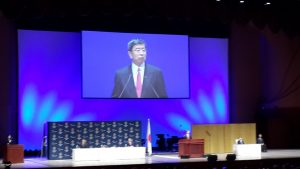
2017 Yokohama – ABA delegates join ADB Annual Meeting
ABA continues to establish linkage with other regional organizations. In particular, ABA aims to strengthen ties with the Asia-Pacific Economic Cooperation (APEC) forum through the APEC Business Advisory Council (ABAC) and continue to provide inputs and recommendations to ABAC on regional cooperation as well as on issues of concern to the private sector in general and the banking industry in particular. Closer working relationship is also constantly being developed with the Pacific Economic Cooperation Council (PECC), the Asian Development Bank, the World Bank, and the Bank for International Settlements.

November 16-17, 2017 Mumbai – State Bank of India (SBI) will host the 34th ABA Conference
The ABA annual meetings and conferences have been very effective tools for bringing together top Asian bankers and for exchanging information and ideas among the members. The themes of these meetings and seminars have focused on the identification or promotion of the role of banking and finance in regional cooperation or on the improvement of the banking industry in the region. ABA continues this tradition and maintains the quality of their contents by ensuring that they are always relevant and topical. To ensure a substantive discussion of issues, Ministers of Finance or Central Bank Governors, as well as international experts and eminent authorities on financial issues, are invited to attend the annual meetings and seminars.

